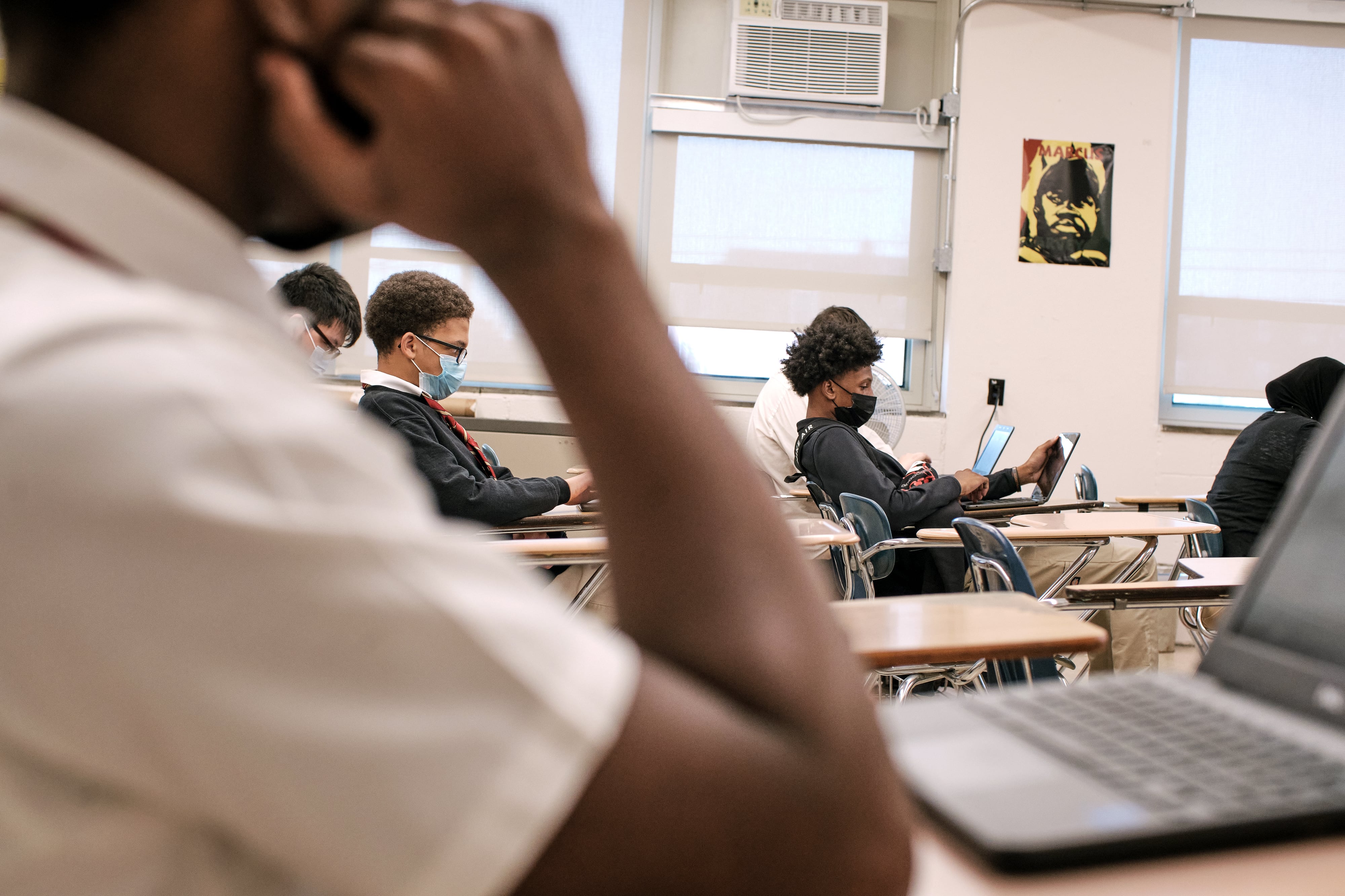Sign up for Chalkbeat Philadelphia’s free newsletter to keep up with the city’s public school system.
Pennsylvania will require nearly all students to take state standardized tests online by 2026, Gov. Josh Shapiro announced Thursday.
During a press conference at Pittsburgh’s Northgate Middle School, Shapiro said the move would free up more classroom time for learning, save the state money, and reduce time spent on test preparation and processing.
Schools across the state can already choose to administer their Pennsylvania System of School Assessment (PSSA) and Keystone state exams online or using pencil and paper. But by 2026, all schools will be required to give all tests online, Shapiro said. However, paper-and-pencil assessments will still be available for students who need special accommodations, according to a statement from the state Department of Education.
The Philadelphia district already administers online assessments and each student is provided a laptop or tablet device, said spokesperson Christina Clark in an email. Though “we do not know what the specific requirements for online PSSA/Keystones districtwide will be,” she said, “we are confident that we will be able to make any necessary adjustments that are needed by 2026.”
The window for administering this year’s PSSA in schools, including Philadelphia, starts next week. According to a statement from the state Department of Education, 32% of schools in Pennsylvania have already started giving their assessments online.
In explaining the decision, Shapiro said that students do “a ton of interactive learning on their computers” and moving the tests online would be a better fit for their classroom experience. The state also plans to adapt the online tests to include more items like drag-and-drop elements, sorting, and graphic manipulation questions.
Educators have long argued state tests are a burden and impact classroom flow while providing limited information on what students are learning. Forty-eight states, including Pennsylvania, already offer optional online testing. And New York City is also moving to drop the pencil and paper alternative for some grades by 2026.
“We are spending too much time on these fill-in bubble sheets,” Pennsylvania Secretary of Education Khalid Mumin said, adding that this move is part of Shapiro’s promise to “reimagine” public education in the commonwealth.
The traditional tests, mostly multiple choice, are limited in value and “take too damn long,” Shapiro said. He also said they place a major bureaucratic burden on teachers that’s separate from their primary job.
To be sure, online tests have their limits. There is some evidence that students tend to perform worse on exams taken on a computer, tablet, or other device than on one taken with pencil and paper.
Shapiro’s announcement about online exams wasn’t the only testing news from Thursday’s event.
To better assess student progress and achievement, the state Department of Education is also developing a new “benchmarking” tool to help educators identify if students are on track to succeed, flag any potential issues early so they can be addressed before testing begins, and help teachers “respond to unique student needs to set them up for success.”
“What we really want [is for] our teachers and students to be able to collaborate on learning, that’s the environment that we want to create,” Shapiro said.
At the same time, Shapiro took the chance to criticize testing broadly. He said the state is working to “get rid of [standardized] tests entirely.” But he noted he can’t do that without losing $600 million in federal aid.
The main federal law governing K-12 requires standardized testing in certain grades and subjects. Shapiro said his administration is working with the federal government to relax the standardized testing requirements on states.
“Trust me, the moment that they provide some easing of those requirements, we will ease them as well here in Pennsylvania,” Shapiro said.
Mumin said the Pennsylvania Department of Education will be ready to help districts make the switch in 2026 through professional development, webinars, tutorials, monthly newsletters, a help desk, and more.
“No student is going to be inhibited by this process or held behind by this process,” Shapiro promised.
In a statement following the announcement, Shapiro’s administration also claimed the move to online testing would save the Commonwealth $6.5 million a year and reduce its carbon footprint by cutting back on printing, packaging, and shipping test materials.
Carrie Wynn, an 11th grader at Northgate who appeared at the press conference, said taking her state tests online eased some of the pressure that can come with the exams.
“I cannot stand here today and say that moving to online testing has made me more excited for testing, but it was not the nerve wracking change that I had anticipated,” Wynn said. “It was more similar to the way we learned in class than the old paper tests … while they still aren’t fun, that made these tests less stressful for me.”
The PSSA is given in the spring to students in grades three through eight in English Language Arts, math and science.
The Keystone exams are administered in winter and spring to high school students in Algebra I, Biology and Literature. Keystones are currently most commonly administered via pencil and paper.
Dale Mezzacappa is a senior writer for Chalkbeat Philadelphia, where she covers K-12 schools and early childhood education in Philadelphia. Contact Dale at dmezzacappa@chalkbeat.org.
Carly Sitrin is the bureau chief for Chalkbeat Philadelphia. Contact Carly at csitrin@chalkbeat.org.






